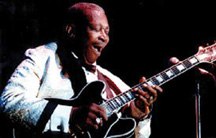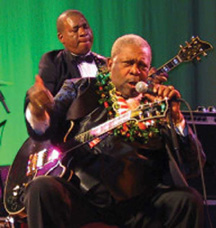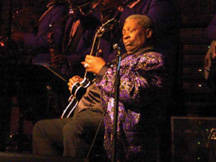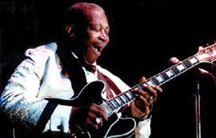 Local 71 (Memphis, TN) member B.B. King and his guitar Lucille have traveled to 90 different countries together.
Local 71 (Memphis, TN) member B.B. King and his guitar Lucille have traveled to 90 different countries together.
It’s a freezing winter night in the1950s in Twist, Arkansas. In a little club, people are dancing to a young blues guitarist. The warmth of their moving bodies heats up the place, as does a small kerosene stove in the corner. Two fans begin pushing one another over a woman named Lucille who works in the nightclub. They knock over the stove, and a river of flames engulfs the place.
People scramble for the doors. Once outside, the guitarist realizes that he has forgotten his $30 acoustic guitar inside the building. He rushes back into the searing heat. “It was hard to get instruments and I thought only of getting my guitar out of there,” says the guitarist, who goes by the name B.B. King these days. King, a member of Local 71 (Memphis, TN), named his guitar after the woman to remind himself never to do something so foolish as rushing into a burning building to save an instrument. These days, a wiser King, who is currently touring with Lucille XVI, would only commit a similar act of bravery to save a human life.
King’s 51 years as a recording musician and tour stops in 90 countries have ensured that Lucille is a name familiar to blues fans worldwide. Lucille has become a signature model guitar manufactured by Gibson to King’s specifications, and she’s taken the musician from the juke joints of the South to Carnegie Hall.
Money In the Hat
Today, King, who once made 35 cents a day picking cotton, is a multimillionaire as a result of his music. His most successful album, “Riding with the King,” in collaboration with Eric Clapton, came out when King was almost 75. It sold 4.5 million copies worldwide, and it’s estimated that, over the course of his career, King has sold over 40 million records. Mere financial gain, though, is not all that King has earned from his particular version of the blues. He has also been awarded five honorary doctorates from institutions as prestigious as Yale University and the Berklee School of Music.
These accomplishments are nothing short of amazing, considering that King started out on the street corners of his hometown of Indianola, Mississippi. In those days, King aspired to be a gospel musician, idolizing a local preacher who played guitar in church. Experience on the corners, however, sent him down a different path.
“When people would ask me to play a tune, if I played a gospel tune, they would always praise me highly, but hardly put anything in the hat,” he recalls. “People that asked me to play blues would always put something in the hat. That’s why I’m a blues singer.”
It didn’t take long for King to outgrow street corners. At 20, he traveled on the back of a grocery truck to Memphis, carrying only his guitar and $2.50 in his pocket. A few years later, King landed his own 10-minute radio show on WDIA, called the “King Spot.” On every show, he sang the sponsor’s jingle, “Pepticon, Pepticon, sure is good/ You can get it anywhere in your neighborhood.” Thus, the Pepticon Boy, as he was known, took the first step on his path toward musical legend.
New Opportunities, New Name

The “chairman of the board” belts out the blues in concert for dedicated fans.
King’s show was so popular that he was soon offered a job as a DJ. He played records by artists such as Sarah Vaughan and Frank Sinatra, who would one day invite him to share “booze and broads” in Las Vegas. Before he could achieve the level of success that allowed him to hang out with Sinatra, he was told to change his name from Riley King to something catchy. For a while, he performed as Beale Street Blues Boy, then just Blues Boy King, until he finally shortened it to B.B. King.
To many black teenagers in the 1960s, blues was their parents’ music, largely a thing of the past. One of King’s hardest moments was at the Royal Theater in Baltimore, Maryland where he was booed by a young crowd that wanted to see the hot young acts on the bill, Sam Cooke and The Drifters. It stung King to be treated poorly, but as a sharecropper’s son from the South, he learned how to achieve his goals in spite of people’s cruelty.
“You knew it was something you had to do,” he says, likening that moment in Baltimore to racial difficulties from his childhood. “You’d go ahead and do the best you could, thinking you’re by yourself, that nobody cares. Life goes on.”
That same determination characterized King’s early career. He first recorded in 1949, including a song named after the first of the two wives he has had, “Miss Martha King.” It wasn’t until 1952, when he released “Three O’Clock Blues,” that King’s music caught on. The song, which was recorded in the back room of a Memphis YMCA, put places like Harlem’s Apollo Theater on his touring itinerary. King developed a distinct musical style in the ’50s through constant touring. In 1956 he played 342 shows, taking the sounds of influences such as T-Bone Walker and Blind Lemon Jefferson and combining them with other musicians he loved, such as jazz guitarists Django Reinhardt and Charlie Christian.
Growing Reputationand Rapport
This extended period of success culminated in the 1965 album, “Live at the Regal.” The album is still a favorite with fans and critics alike, partly because of the precision of the guitar work, but also because of King’s rapport with the crowd. Some of King’s most important fans at the time were the white rock musicians who borrowed heavily from the blues to develop their sounds. In a 1966 Crawdaddy interview Mike Bloomfield, guitarist for the Butterfield Blues Band, said, “B.B. King is one of the greatest guitarists who ever lived and more people should listen to B.B. King’s records.”
Legendary rock promoter Bill Graham took Bloomfield’s advice and booked King to play at the Fillmore West in San Francisco. When King pulled up to the club, he thought he was in the wrong place because of all the long-haired white kids milling around outside. He worried that he might get booed. King didn’t usually drink before shows, but was so nervous that he asked Graham to get him a drink. Graham got a whole bottle of whiskey for the anxious artist.
After a short introduction by Graham, who called him “the chairman of the board,” the crowd went wild. They gave King his first standing ovation that night. The 43-year-old blues giant was so touched, he cried on stage. In a recent PBS documentary on the blues, King still got choked up recalling the moment.
It was a turning point for King that signaled the direction his career has headed in to this day. King says that, in his early days, 90% of his audience was black and his age or older. Today, King says his audience is much younger than he is and 95% white. This is partly a result of musicians who have incorporated King’s blues into their own music.
King is thankful for the help he received from devoted fans such as Eric Clapton and Eric Burdon.
“People didn’t value what we did as anything special until the British groups started playing what I call Real Important Blues, and white people started to pay attention to it,” he recently told The New York Times. “These groups played it, supported it, and opened alot of doors for B.B. King and a lot of people like him,” the article’s author commented.
Strength in Numbers

B.B. King released his most popular and succesful album at the young age of 75.
A lot of doors were opened for King by the AFM as well. The blues chairman joined the union in 1949 because it promised “better wages.” He is most grateful, however, for the protection the union offered him.
“It’s an old and true saying, ‘there’s strength in numbers,'” says King. “Sometimes you’d go places and people wouldn’t pay you. The union was good then, because they’d put them on the unfair list and nobody would go and play for them.”
While the AFM helped King deal with the less pleasant aspects of the music business, the MP3 player that travels everywhere with him helps remind him why he chose to be a professional musician early in life. He keeps the music of his influencesWalker and Jefferson, as well as Lonnie Johnson and Muddy Watersclose at hand so that he can revitalize his passion for the blues at the push of a button. King says that listening frequently to his idols ensures that his music does not depart from what he cares most about.
King’s performances today give no indication that his success has taken away his feeling for the blues. Just like he did long ago that night in Twist, Arkansas, he makes people want to dance. When he’s up on stage, he plays for the crowd, not for himself. That’s why, from a sitting position, he and Lucille still have the power to bring people to their feet.
King says he performs every song as if he hasn’t played it before. This simple yet highly effective philosophy, shared with his band to prevent songs he has played for decades from becoming stale, underlines why he has continued to nurture an avid international following.
“Play it like you feel it,” he says, repeating what he tells his band. “Don’t try to play it like you recorded it 10 years ago. Play it today, like you feel it now.”
Visit the official B.B. King Web site at www.bbking.com.

